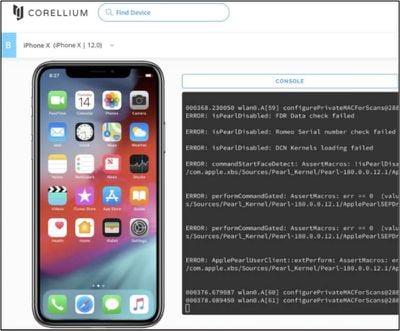Apple Loses Copyright Claims in Lawsuit Against Corellium
Corellium, a mobile device company that supports iOS, this week won a significant victory in its legal battle against Apple. Apple last year sued Corellium for copyright infringement because the Corellium software is designed to replicate iOS to allow security researchers to locate bugs and security flaws.

According to The Washington Post, a Florida judge threw out Apple's claims that Corellium had violated copyright law with its software. The judge said that Corellium successfully demonstrated that it operates under fair use terms.
"Weighing all the necessary factors, the Court finds that Corellium has met its burden of establishing fair use," Judge Smith wrote Tuesday's order. "Thus, its use of iOS in connection with the Corellium Product is permissible."
In its lawsuit, Apple said that Corellium illegally replicated the operating system and applications that run on the iPhone and iPad. "Corellium has simply copied everything: the code, the graphical user interface, the icons - all of it, in exacting detail," Apple said in the original filing.
Corellium's software does indeed create digital replicas of iOS, iTunes, and user interface elements available on a web-based platform or custom platform built by Corellium, with the software posed as an exact copy of iOS to allow security researchers to locate bugs. Corellium argued that its software helps Apple by making it easier for security researchers to find flaws and has also accused Apple of using the lawsuit to "crack down on jailbreaking."
Corellium claimed that Apple's code in its product is "fair use," which the judge in the case agreed with. Apple has also said that Corellium circumvented Apple's security measures to create its software and violated the Digital Millennium Copyright Act, and that claim has not been tossed out. Apple has not yet commented on the decision.
As an alternative to Corellium, Apple launched a Security Device Research Program to give vetted researchers access to specially-configured iPhones that are less locked down than consumer devices with the aim of helping researchers locate bugs in iOS. Apple in late December began sending out the first of these research iPhones.
Popular Stories
Apple's next-generation iPhone 17 Pro and iPhone 17 Pro Max are less than three months away, and there are plenty of rumors about the devices.
Apple is expected to launch the iPhone 17, iPhone 17 Air, iPhone 17 Pro, and iPhone 17 Pro Max in September this year.
Below, we recap key changes rumored for the iPhone 17 Pro models:Aluminum frame: iPhone 17 Pro models are rumored to have an...
The long wait for an Apple Watch Ultra 3 appears to be nearly over, and it is rumored to feature both satellite connectivity and 5G support.
Apple Watch Ultra's existing Night Mode
In his latest Power On newsletter, Bloomberg's Mark Gurman said that the Apple Watch Ultra 3 is on track to launch this year with "significant" new features, including satellite connectivity, which would let you...
The upcoming iPhone 17 Pro and iPhone 17 Pro Max are rumored to have a slightly different MagSafe magnet layout compared to existing iPhone models, and a leaked photo has offered a closer look at the supposed new design.
The leaker Majin Bu today shared a photo of alleged MagSafe magnet arrays for third-party iPhone 17 Pro cases. On existing iPhone models with MagSafe, the magnets form a...
iOS 26 and iPadOS 26 add a smaller yet useful Wi-Fi feature to iPhones and iPads.
As spotted by Creative Strategies analyst Max Weinbach, sign-in details for captive Wi-Fi networks are now synced across iPhones and iPads running iOS 26 and iPadOS 26. For example, while Weinbach was staying at a Hilton hotel, his iPhone prompted him to fill in Wi-Fi details from his iPad that was already...
The iPhone 17 Pro Max will feature the biggest ever battery in an iPhone, according to the Weibo leaker known as "Instant Digital."
In a new post, the leaker listed the battery capacities of the iPhone 11 Pro Max through to the iPhone 16 Pro Max, and added that the iPhone 17 Pro Max will feature a battery capacity of 5,000mAh:
iPhone 11 Pro Max: 3,969mAh
iPhone 12 Pro Max: 3,687mAh...
Apple today seeded the second betas of upcoming iOS 18.6 and iPadOS 18.6 updates to public beta testers, with the betas coming just a day after Apple provided the betas to developers. Apple has also released a second beta of macOS Sequoia 15.6.
Testers who have signed up for beta updates through Apple's beta site can download iOS 18.6 and iPadOS 18.6 from the Settings app on a compatible...
Apple is developing a MacBook with the A18 Pro chip, according to findings in backend code uncovered by MacRumors.
Subscribe to the MacRumors YouTube channel for more videos.
Earlier today, Apple analyst Ming-Chi Kuo reported that Apple is planning to launch a low-cost MacBook powered by an iPhone chip. The machine is expected to feature a 13-inch display, the A18 Pro chip, and color options...




















